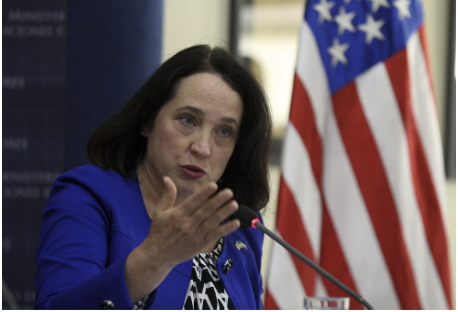Promoting Our National Interests Through UNESCO, by Michael Schneider
Ambassador Jean Manes believes the U.S. has enhanced two key strategic interests by resuming our membership and leadership in UNESCO.
- Without our presence in that international body, China will fill a leadership vacuum to the detriment of important U.S. interests in AI, global communications and relevant human rights concerns.
- Ambassador Manes also pointed out that the U.S. provides key support for Israel in UNESCO, which, with UNESCO recognition of Palestinian membership, is no longer a member of the international body.
Bipartisan support will help the U.S. advance American interests in diverse fields covered by UNESCO.
 Speaking to a PDCA Zoom session December 16, Amb. Manes outlined the history of UNESCO and the debate over U.S. membership and our role in that international body. She outlined the many benefits to American society of UNESCO designation of cultural and historic sites and urged her audience to consider the several benefits from ongoing U.S. participation.
Speaking to a PDCA Zoom session December 16, Amb. Manes outlined the history of UNESCO and the debate over U.S. membership and our role in that international body. She outlined the many benefits to American society of UNESCO designation of cultural and historic sites and urged her audience to consider the several benefits from ongoing U.S. participation.Already, there are 26 cultural and national heritage sites in the U.S., according to Amb. Manes, as well as 22 university chairs and nine “creative city networks” in the U.S. have been designated a UNESCO World Heritage Site. A historic Moravian Church settlement in Bethlehem, PA, joined the list last July, and was profiled on the PBS News Hour December 25. That news feature illustrates the value of UNESCO's work.
The U.S. is better equipped to have a constructive impact on the meaning and fulfillment of UN Strategic Development Goals (SDGs) through our participation in UNESCO, according to Amb. Manes. Moreover, in this time of crisis in the Middle East, we can more effectively defend Israel from policy attacks by others.
A bi-partisan U.S. Commission for UNESCO is to be reconstituted but will be a smaller group than in the past, according to Amb. Manes. It will include representatives from major institutions such as the Smithsonian Institution and National Science Foundation. There is a significant opportunity for increases partnerships with U.S. private sector and foundations.
We continue to have and support two U.S. UNESCO “Goodwill Ambassadors” jazz musician, bandleader, and composer Herbie Hancock and actor, director and producer, Forrest Whitaker.
The major focus of UNESCO, like other specialized UN bodies relates extensively to developing countries, particularly in Africa, where population growth and under-developed economies pose important challenges to the world but also contain untapped resources, creative talent and a more youthful labor force.
The bottom line from my vantage: If the U.S. doesn’t participate in UNESCO, we will cede the public debate to strategic competitors and others whose policies and goals differ greatly from the U.S.
Increasingly, global affairs will be shaped by the digital revolution in the 21st century. Invention and Influence in the information space will shape other endeavors. In a recent address to the UN, Secretary of State Blinken made a succinct case for intense attention to the proper evolution of AI.
Active membership in UNESCO will help the U.S. promote vital interests and values in world affairs. We shouldn’t cede this influence because others disagree with our policies.
Michael Schneider, a former President of the Public Diplomacy Association of America and director of Maxwell-Newhouse Washington Public Diplomacy Program, is a public diplomacy and foreign policy professional with USIA and State Department.